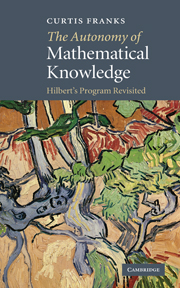4 - Intensionality
Published online by Cambridge University Press: 07 January 2010
Summary
INTRODUCTION
In [1960] Solomon Feferman observed a philosophical distinction between Gödel's two incompleteness theorems (Gödel [1931], Satze 6, 11). The first of Gödel's theorems is that if the system S comprised of the Dedekind–Peano axioms, the underlying logic of Russell's Principia Mathematica, and the axiom of choice is ω-consistent, then it is also incomplete, (i.e., there are sentences Φ in the language of S such that, if S is ω-consistent, then neither Φ nor ¬Φ is S-provable). Gödel proved this by exhibiting, as an instance of such a Φ, the arithmetization of the metatheoretical statement that declares its own S-unprovability. The second theorem says that another unprovable sentence is the arithmetization of the metatheoretical statement of the consistency of S. Feferman's distinction is not strictly speaking one between these theorems, but rather between the way they are ordinarily paraphrased in natural language. The first theorem is taken to mean that if S is consistent, then there are sentences in the language of S that S can neither prove nor refute. Feferman finds this unproblematic, in contrast to the typical rendering of the second theorem as, “If S is consistent then it cannot prove its own consistency.” By understanding the second theorem this way, he claims, one implicitly holds some complex commitments about the nature of Gödel's arithmetization techniques. Let us close in on Feferman's distinction in three stages.
- Type
- Chapter
- Information
- The Autonomy of Mathematical KnowledgeHilbert's Program Revisited, pp. 105 - 138Publisher: Cambridge University PressPrint publication year: 2009



